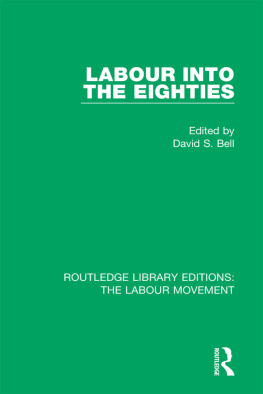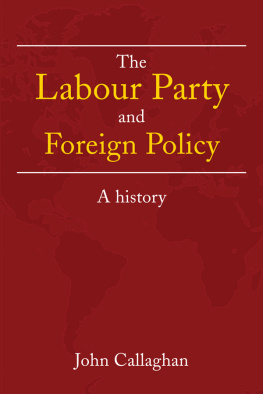ROUTLEDGE LIBRARY EDITIONS:
THE LABOUR MOVEMENT
Volume 3
LABOUR INTO THE EIGHTIES
LABOUR INTO THE EIGHTIES
Edited by
DAVID S. BELL
First published in 1980 by Croom Helm Ltd
This edition first published in 2019
by Routledge
2 Park Square, Milton Park, Abingdon, Oxon OX14 4RN
and by Routledge
711 Third Avenue, New York, NY 10017
Routledge is an imprint of the Taylor & Francis Group, an informa business
1980 David S. Bell
All rights reserved. No part of this book may be reprinted or reproduced or utilised in any form or by any electronic, mechanical, or other means, now known or hereafter invented, including photocopying and recording, or in any information storage or retrieval system, without permission in writing from the publishers.
Trademark notice: Product or corporate names may be trademarks or registered trademarks, and are used only for identification and explanation without intent to infringe.
British Library Cataloguing in Publication Data
A catalogue record for this book is available from the British Library
ISBN: 978-1-138-32435-0 (Set)
ISBN: 978-0-429-43443-3 (Set) (ebk)
ISBN: 978-1-138-32487-9 (Volume 3) (hbk)
ISBN: 978-0-429-45066-2 (Volume 3) (ebk)
Publishers Note
The publisher has gone to great lengths to ensure the quality of this reprint but points out that some imperfections in the original copies may be apparent.
Disclaimer
The publisher has made every effort to trace copyright holders and would welcome correspondence from those they have been unable to trace.
Labour Into
The Eighties
EDITED BY DAVID S. BELL
CROOM HELM LONDON
1980 David S. Bell
Croom Helm Ltd, 210 St Johns Road, London SW11
British Library Cataloguing in Publication Data
Labour into the eighties.
1. Labour Party
I. Bell, David Scott
329.941 JN1129.L32
ISBN 0-7099-0443-6
ISBN 0-7099-0607-2 Pbk
Reproduced from copy supplied
printed and bound in Great Britain
by Billing & Sons Limited
Guildford, London, Oxford, Worcester
CONTENTS
The origins of this book lie in a trip to France in June 1976 when Peter Holmes, Saul Estrin and I went to visit the French Planning Ministry. It has taken some time actually to get the project under way but thanks are due to many people. In particular I should like to thank Christopher Helm for his encouragement, Gilles Martinet for his advice and his time, and other people too numerous to mention, who have given their advice over the last year.
It is only fitting that I add a dedication to friends in the French Socialist Party whom we met on that visit, particularly to J.M.B., M.B. and G.V. in Paris and P.B. and B.D. in the Nord.
David S. Bell
David S. Bell
This book is not meant to be a post-mortem on the Labour Government of 197479; there is already one excellent book on that subject by P. Townsend and N. B. Bosanquet and there will no doubt be many more to rake over that dismal record. Nor is this book meant to be a contribution to the internal debate within the Labour Party, although most of the contributions touch on issues which will be of central concern to that discussion as it progresses. Rather this book is meant to be a series of socialist policy proposals relevant to specific areas of decision making. In other words, each of the authors is answering the question as to what sorts of policies and what particular measures they would recommend to the Labour Party for acceptance in the eighties.
The proposals are naturally given the small space somewhat limited, but it has been left to each author to decide what he will suggest: there has been no attempt to impose an over-all view. Even if it were possible, this book is not an attempt to upstage the manifesto; it is merely a contribution, a series of modest proposals. Each chapter has a short conclusion laying out the detailed points of policy, but in the body of the chapters the authors review some of the alternatives and give substantive reasons for the conclusions they have reached. All the authors are members of the Labour Party and they are all dealing with areas of decision making with which they are familiar either professionally or as members of the Labour organisations.
Unfortunately there are many policy areas which ought to have been covered but which do not have separate chapters devoted to them. Northern Ireland has, for various reasons, no chapter and this is probably the most unfortunate gap because that province will undoubtedly remain one of the most difficult problems that any government will have to face in the eighties and is an area where policy has been unimaginative when it has not been crudely repressive. There are likewise no separate chapters on human rights (i.e. police powers) or trade unions or foreign policy or devolution, etc. The only excuse is that it has not been possible to include everything. Some areas are changing so rapidly that any formulated policy proposals would soon be out of date this was the case with Zimbabwe and others, like devolution, have passed rapidly out of the front rank of issues into the oubliettes of the seventies. The only consolation is that there will be issues for the 1980s which we have not even begun to anticipate.
However, this collection of papers covers a wide spectrum of political, economic and social problems. In the chapters that follow the authors have taken different policy aspects for analysis and discussion. Although there is some overlap on different areas, most of the fields are clearly defined. Thus Peter Holmes (Chapter 1) deals with the problem of the need for an over-all economic strategy, David Marsden (Chapter 3) tackles the problem of the labour market, Saul Estrin discusses, in Chapter 4, the contribution that planning could make to economic policy and John Goode (Chapter 5) writes about the need for an energy policy in eighties Britain. These four chapters form the specifically economic part of the book. By contrast, Chapters 6, 7 and 8 deal with social problems. These are the contributions by Geoff Driver on British minorities problems, by John Gunnell on education, and by Robert Elmore on social services in general. The last three chapters deal with separate policies, but ones where Labour, even if in opposition, could still have an impact. These are Chapter 9 on local government by Tony Eddison, Chapter 10 on the Labour Party itself by Dianne Hayter, and a final chapter on the Common Market.
Peter Holmes, in his chapter on growth and unemployment, discusses what should be the general nature of a Labour economic policy in the next decade. He discusses both monetarism and import controls but his view starts from the standpoint that the death of Keynesianism has been much exaggerated. Unemployment and low productivity, he suggests, are the two main problems which, to be solved, necessitate the control of inflation. Firms must be encouraged to move into the world market and exports should be expanded through the restoration of competitiveness.
It is stressed by Peter Holmes that there are no easy answers; thus he rejects import controls because there are hidden costs, the reduced availability of imports would cause price rises, and import controls benefit only import-competing industries. In a position such as Britains in the eighties, he suggests that the least bad alternative for our severely uncompetitive economy is a substantial devaluation combined with policies which will make this strategy acceptable. This is practically the opposite of Tory Government policy but, so Peter Holmes argues, devaluation will not provoke trade retaliation and will help the strongest part of the export sector.









